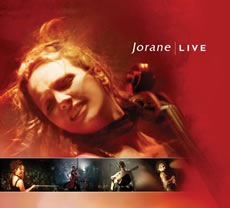
Image © Universal Music (France) 2005
|
|
(31 July 2005) Unique artists are rare, so when they appear there should be cause for celebration. One such artist is the remarkable French-Canadian singer / cellist Jorane. Using powerful cello playing--itself a haunting, intimate and melancholic instrument--in a rock setting, she has recruited a band made up of the excellent rhythm section of Frederic Boudreault (bass) and Alexis Martin (drums). This is the first review in a series of articles on Jorane. Expect a review of her latest studio album The You and the Now and an interview soon. There are no keyboards, but versatile guitarist Simon Godin, who uses a battery of instruments, including pedal steel, played generally in hard-rocking style, also inventively supports Jorane. Think of Steve Howe of Yes playing "Going for the One" to understand the sort of power he brings to the band. In addition to Joranes' amazing, animated cello playing there is also her voice, which has similar qualities to Tori Amos, but with strong folk qualities. The end result is breathtaking: intense, complex, progressive and, at times, hard rocking. Jorane's new album The You and the Now is her first to use English language lyrics to any extent, which has enabled her venture outside her heartlands of Quebec and France. [review link TBA] Jorane Live (Universal Music (France) 9828396, 2005) is a new 80-minute, 16-song collection, thirteen of which were recorded in Montreal in January 2005. An earlier Live album was released in 2002. The power and intensity of the performance we witnessed at GuilFest 2005 (review) are superbly realised, with lyrics in both French and English. The band is first rate, as you would expect, weaving complex patterns around Jorane's rasping cello and powerful voice. The You and the Now album is well represented. The set opens playfully, with the stomp-along folk-rock of "Pour Ton Sourire," written by the legendary Daniel Lanois, the folk theme continuing with "Irish," a bizarrely effective combination of hard rock and folk dance, not to far away, musically, from the ethnic-rock of Norwegian band Gate (review). "Worries" is equally strange, Simon Godins' quirky banjo combining with Jorane's jazzy, half spoken voice, bringing to mind the vocal style of David Byrne. The brief "Stay" has a strong Tori Amos influence – if you replace solo piano with Jorane's solo cello. "Good Luck" begins ethereally, with solo electric guitar and voice, before the rest of the band comes in, lifting the song into something quite astonishing. "Dina" again begins quietly before exploding into a complex progressive tour de force with the Police's "Message in a Bottle" briefly referenced. "Blue Planet" is much more straightforward but wins a place as an album highlight due to the sheer quality of song writing on display, not to mention Jorane's exquisite vocal and the song's dreamy atmosphere. The band follow this with a cheeky cover version of Donna Summer's disco classic "I Feel Love," followed by an older Jorane piece, the sinister "Le Sacre." "Groove" features Frederic Boudreault on double bass, combining with Jorane's plucked cello and Simon Godins' banjo. This is another bizarre combination of instruments, which seems to work. "Film III," probably the closer of the main set, is wonderful, tender and beautiful, and clearly something of a Jorane anthem, as she harmonises with the audience late in the song. Encores would therefore seem to be the aggressive solo cello and voice of "Vent-fou" and "Comme Avant," a ballad for voice and acoustic guitar, with an incredible vocal performance and more audience participation. The three bonus tracks are also interesting, though her earlier work clearly displays a Tori Amos influence, which she seems to be losing as her music matures. "Dit-elle" is another song for solo cello and vocal, while "Pour Gabrielle" is a full-band acoustic number with a quirky, folky arrangement, and a beautifully melodic classical-style cello passage. "Ineffable" closes the album with another slice of dramatic cello and a angry vocal. Like much of the most creative music, Jorane's style is hard to categorise. Certainly folk and classical music can be heard in the mix of influences. Essentially, though, this is rock. Progressive in the purest sense in that it has few boundaries, yet does not pander to the clichés of traditional progressive rock.  In that respect Jorane and her music are deeply refreshing. Wonderful stuff.--Stephen Lambe in Cheltenham, England and Russ Elliot in New York In that respect Jorane and her music are deeply refreshing. Wonderful stuff.--Stephen Lambe in Cheltenham, England and Russ Elliot in New York 
|






